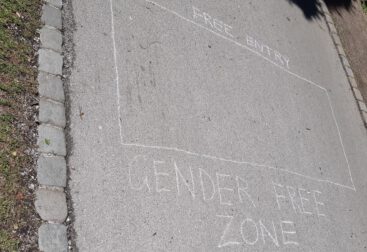Do It Yourself tools
*this list is very incomplete, scattered and full of blank spots. It is growing. So much more could and can be included, these are offered as proposals to trigger more thoughts and actions, to begin together rupturing the systems of colonialism, patriarchy, humanism, anthropocentrism, neoliberalism, capitalism, racism, sexism, heteronormativity, ableism.
General Tactics
- Stop. Pause. Slow down. This is one way to begin looking at these systems, thinking about them, shifting them.
- Employ the tactic of to ‘make strange’. This means to try and take a step back and look at the habits, vocabulary, practises around (and in) us and see them as if they were ‘strangers’.
- Ask yourself in group constellations, who is in the room, and who isn’t. Who is underrepresented? This can mean physically absent or missing power/authority. You could enact solidarity/use your privilege as an amplifier within the room by leaving room for them to speak, listening, inviting them to talk, listening, echoing their opinion, listening, listening. You are not the gracious saviour this is just the first step in not being an oppressor.
Language
- Try to name your identity labels. Cis, white, abled, heterosexual (or whatever it may be) is as much an identity as trans, queer, BIPOC, dis-abled. Let’s stop treating some identities as universal and normal and all others as unlikely deviations.
- Ask someone’s pronouns/articulate your pronouns or no-nouns. A pronoun (he/she/they) is a replacement for the name which allocates a gender, maybe someone feels more comfortable having simply their name used instead. (thank you for our beautiful conversation Zwoisy Mears Clark)
- Try asking something else than the sex of a baby as the first thing. Why? Because this breaks down the idea that gender is our defining feature. (try “How is your pregnancy going?” or “What’s their name?”). Through the compliments we give children, the clothes and toys we buy, amongst other ways, construct gender norms and stereotypes. Let’s break down the binary.
- Try referring to your partner, lover, significant other. This helps normalise a non heteronormative vocabulary of referencing.
- Try using non ableist language. Ableist language perpetuates the idea of the inferiority of people with disabilities or neural divergence. For example use boring instead of ‘lame’, ignorant instead of ‘dumb’, incredible instead of ‘crazy’.
(for more https://www.verywellmind.com/types-of-ableist-language-and-what-to-say-instead-5201561) - Try not asking ‘where are you from?’. Although this comes often from a positive, curious position it is an act of othering and can threaten someones feeling of belonging. (also, they probably have been asked this 1000 times before, maybe you can have another type of conversation, “where do you feel local?” could be an alternative).
- Speak up. Silence benefits the oppressor. Some of the hardest moments to locate what is happening or why you feel uncomfortable, are the ‘subtle’ everyday bigoted comments or questions. I’ve been searching for tools and ways of being able to seize the moment. Asking “why do you say that”, “what do you mean by …?”, or repeat back what the person said without the unnecessary racial, ethnic, etc identity label.
Here are some great scenario based resources
https://www.splcenter.org/20150125/speak-responding-everyday-bigotry https://academicaffairs.ucsc.edu/events/documents/Microaggressions_Examples_Arial_2014_11_12.pdf
Actions/Inactions
- Try using products/wearing clothes from both mens and womens departments. Womens bodies are as diverse from one another in form as womens from mens. Clothes don’t have a gender, they are just fabrics and colours.
(see Alok’s work on degendering fashion https://www.youtube.com/watch?v=bHAjOHqUra8 or on instagram at @alokvmenon) - Try not doing anything. The next time you are waiting for someone, leave your phone in your pocket. Neoliberal capitalism trains us that we always need to be consuming or producing a product. Don’t.
- Spend 10 minutes a day with another species. (this is a proposal from Maija Hirvanen that I really appreciate).
- Decolonise your bookshelf/movie shelf/podcast shelf. Who’s voices and stories are we hearing? This is a way to step out of the reproduction cycle of centering white* perspectives and in itself through hearing these it can rupture our narrative of ‘normal’, rupture biases, rupture preconceptions, rupture…(try Octavia Butler, Alice Walker, Toni Morrison, Alec Baldwin, Zadie Smith)
*could be interchanged with able, heterosexual, cis, male. - Try ways of opening up dialogue that is being dominated and monopolised by one person (often but not limited to white, cis men). This is usually because of and contributes to established power dynamics and social codes of polite etiquette make it hard to shift this dynamic.
Here are some strategies I have been working on https://practising-ruptures.org/democratising-a-conversation/
To be continued…



